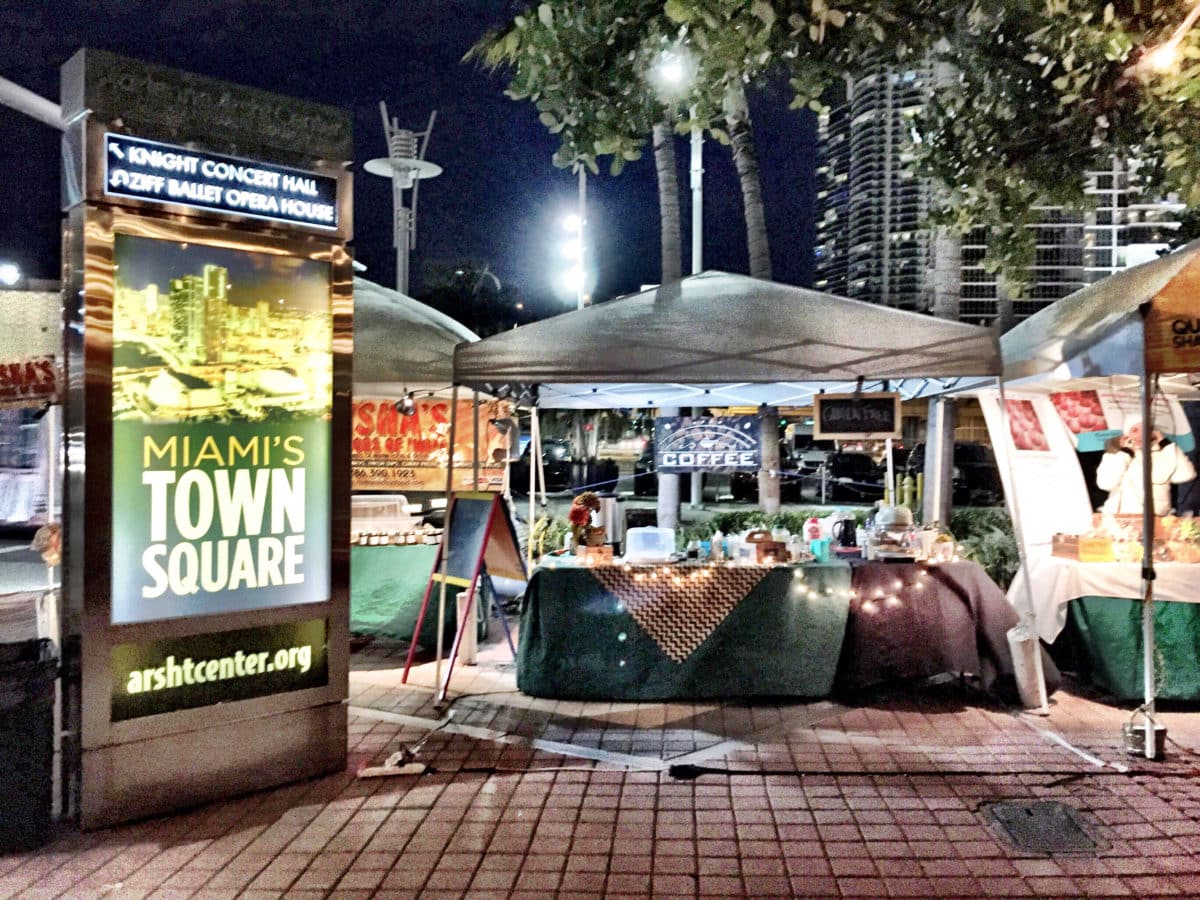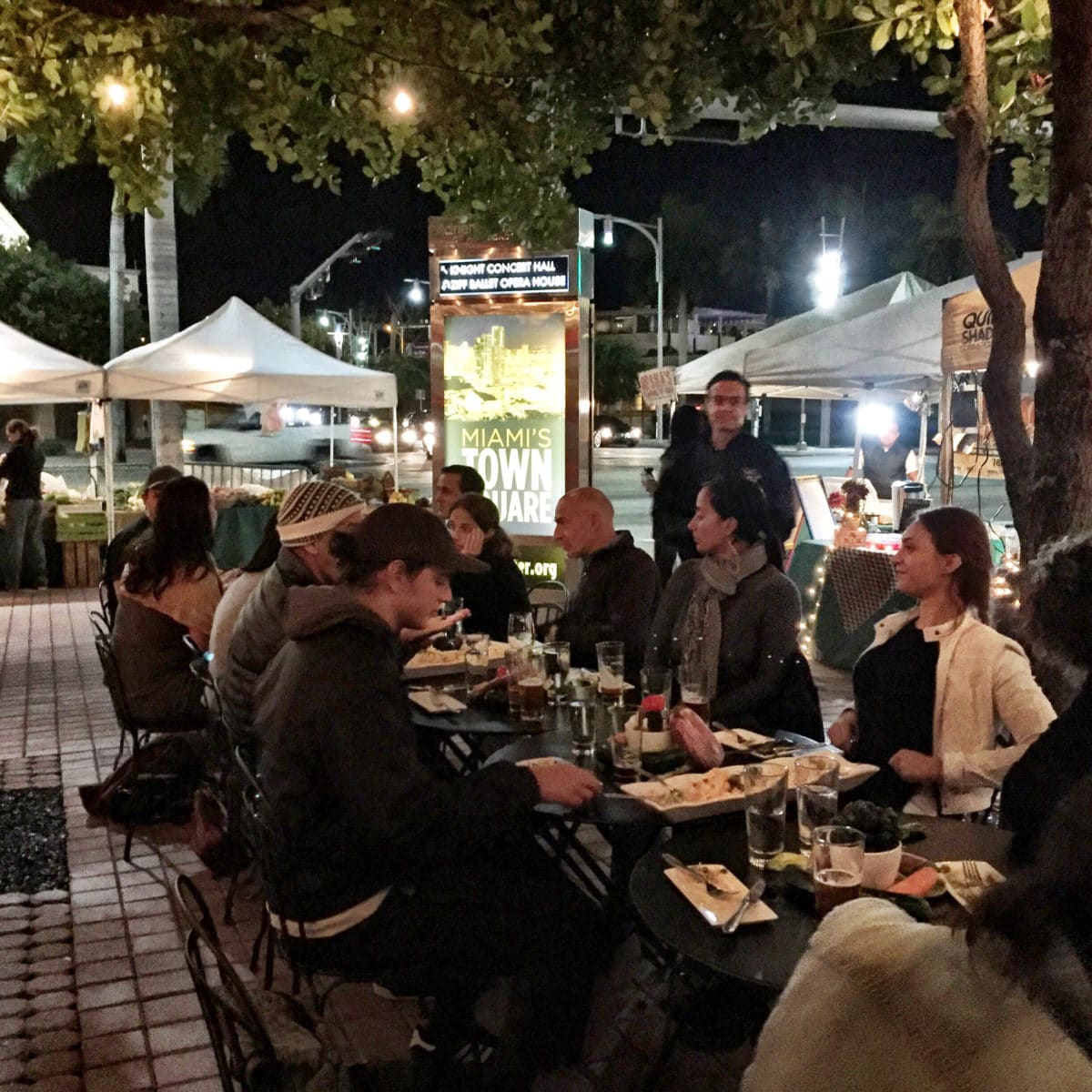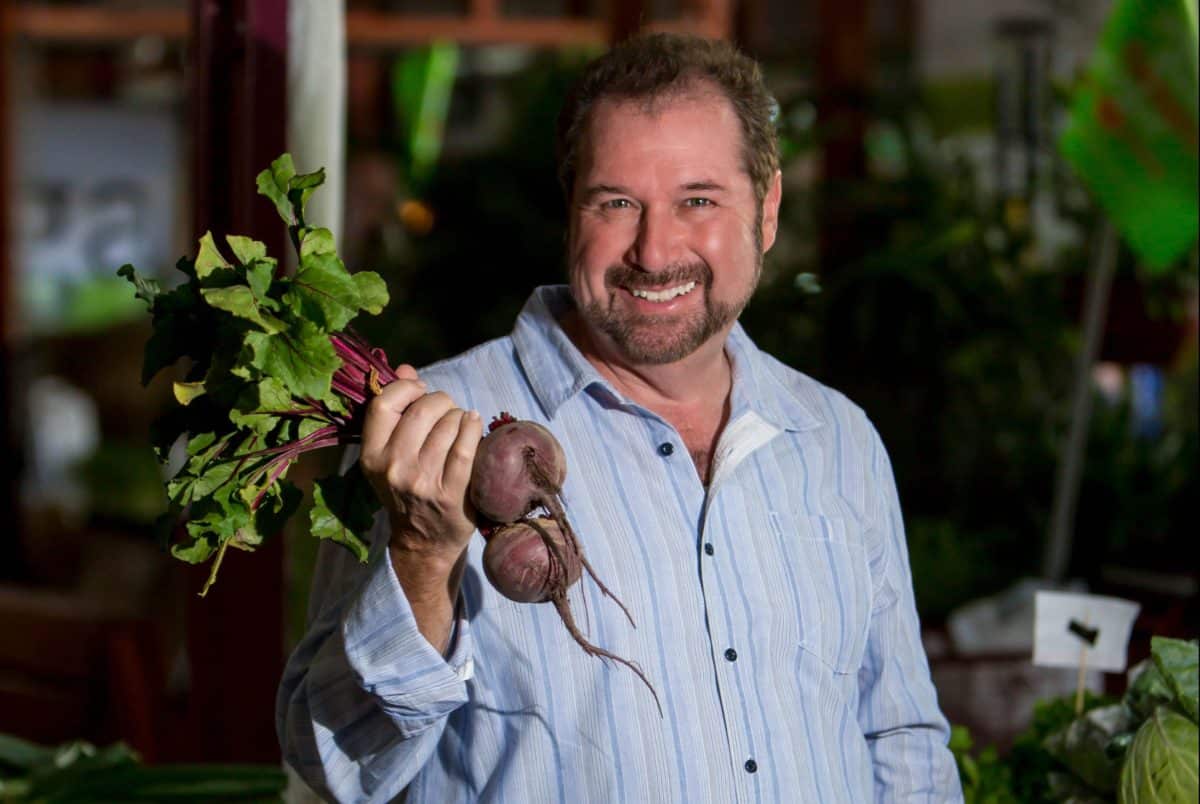It’s the first Monday of January on an uncommonly cool evening in Miami, but spirits are high as diners arrive at the long communal tables on the Books and Books patio at the Adrienne Arsht Performing Arts Center. We’re here for acclaimed Chef Allen Susser’s weekly Farm to Table Dinner, a multi-course vegetarian feast using produce from the Monday farmers market set up on the same outdoor space.

Tonight’s dinner is appropriately themed “North,” and the courses are paired with generously poured libations from Miami’s Wynwood Brewery Company, the city’s first craft production brewery. It doesn’t take long for strangers to become friends as huge platters of the yummy appetizers, served family style, are placed on the table one at a time with their beer pairings, and the amiable Chef Allen shares food notes. I think that nothing could be as tasty as the malt-baked eggplant fries with honey, soy, and sriracha, until I taste the hops-roasted red and yellow beet salad with goat cheese, apple radish, and kale slaw. Heavenly. The equally delicious main course — coffee roasted butternut squash, mushroom barley, and toasted corn polenta — and delectable dessert of beer-braised Bartlett pear with candied pumpkin seeds and spiced chocolate sauce, are served plated.
“Eating outdoors is a special experience,” says Chef Allen. “I’ve always loved it, whether at the beach, in the backyard, on a camping trip — there’s a wide open energy that lets you experience the environment at the same time as the food. It excites the senses, and we need to realize that food is about the senses.”
Allen Susser has long been one of Miami’s most venerated chefs. His highly lauded Chef Allen’s restaurant opened in 1986 and went on to a spectacular 25-year run, with food that drew on the city’s year-round growing season and Latin influences, creating the “New World Cuisine” Miami has subsequently become known for.
Chef Allen’s love of food began during his boyhood in Brooklyn. He can’t remember a time when he didn’t want a career in the restaurant industry. “My family lived in a three-family house, with my grandmother on the first floor,” he says. “I was a middle child and got left with my grandmother a lot to go food shopping with her in the neighborhood. The produce guys were hawkers and you had to get their attention to get the fruit you wanted. At the fish stores, there were fish swimming in tanks. We were kosher and I grew up eating traditional Jewish food — strudel, honey cake, matzoh ball soup, kosher chicken. At the same time, I was tasting Italian and Puerto Rican foods at my friends’ houses. No one in the neighborhood went hungry.”
After attending a two-year restaurant management program at New York City Technical College, Susser earned a degree in hospitality management from Florida International University (FIU). But it was between the two schools, during a one-year break in Paris, that he was transformed by hands-on experience. “Before Paris, it was about a job and a career,” he says. “After Paris, it was about the food. To be living there at 19 and cooking was living the dream — even though I got my ass kicked as the only American in the kitchen.” Working in the Michelin-starred kitchens of the Le Bristol Hotel, he was exposed not only to how things actually worked in a restaurant kitchen, but also to raw ingredients he’d never seen before: “Chickens that I had to pluck, crabs that came in live and ugly, wild mushrooms that I had never heard of. Meanwhile, back in the U.S., fast food reigned and we were looking at convenience boxed goods coming into the restaurant.”
After graduating FIU with the goal of becoming a serious chef, Susser went to work at Le Cirque in New York City, then headed back to Miami a few years later to escape the cold winters and work as a sous chef at the Turnberry Isle resort. He was there for five years, “in a major kitchen learning by hands-on doing and exploring how to use our local resources. This is what French cooking taught me — using local foods that are in season.” What this meant in early 1980s Miami was moving beyond the ubiquitous stone crabs and key limes to a plethora of fresh fish including snapper, grouper, pompano, wahoo, cobia, and Spanish mackerel. Although Miami is defined by water, it doesn’t have a major fishing port, and back in the early 1980s there were few seafood restaurants. Nevertheless, there was more variety of fresh fish than anywhere else in the country, notes Susser, “and fish became a big focus at Turnberry.”
As he moved on to open Chef Allen’s in Aventura, he began to create what became known as New World Cuisine, infusing dishes with a Latin sensibility using all of the tropical fruits and vegetables native to south Florida. The tropical fruit season here lasts from spring into summer, yielding mangos, guavas, papayas, and soursops. To this day, Chef Allen enjoys taking “mango joy rides” around Miami neighborhoods to check out the more than 40 local varieties of mangos growing in residential backyards. Autumn and early winter is citrus season, with such fresh fruits as tangerines, kumquats, tangelos, and pomelos (grapefruits, Chef Allen explains, are actually a cross between a pomelo and an orange). His cuisine also utilized the local starchy root vegetables that grow year-round in Miami and are emblematic of Latin cooking: pumpkins, chayote, plantains, calabaza, and boniato.
“New World Cuisine came from all these interesting ingredients and the Latin and Caribbean influence in Miami,” says Chef Allen. “It’s important to remember that the Dutch, Spanish, English, and French all colonized the Caribbean and brought their old world cooking techniques to the region. This whole basket of ingredients and cultures was ripe to put on the plate, with a modern sensibility. It was a fabulous time to plant a new culinary footprint in Miami, and I still see it growing and developing.”
With such accolades as The New York Times dubbing him “the Ponce de Leon of New Floridian cooking;” Food and Wine magazine naming him as one of the top 10 new chefs in America (1991); and The James Beard Foundation honoring him with a Best Chef Award (1994), Chef Allen made his mark as one of America’s top chefs. In 1995, his first book New World Cuisine and Cookery was published (Doubleday), followed by The Great Citrus Book, (1997 Ten Speed Press) and The Great Mango Book, (2001, Ten Speed Press).
Today, having closed his restaurant and transitioned to a “sustainable consulting” business for such diverse clients as the Café at Books and Books in Miami and the Jade Mountain resort in St. Lucia (which has a 30-acre organic farm and 1,000 cacao trees), Chef Allen “cooks for the cause of creating community.” He launched the Monday farmers market at the Café at the Arsht to “bring people in at a ground level” to the complex: “a beautiful location, but many were passing it by because they didn’t go to performances,” he says. From there, it was a natural to offer the weekly vegetarian dinners that started in January 2015, “not because I’m a vegetarian but because we have only vegetable farmers at the market. I love using their vegetables to create new dishes I haven’t cooked before.” The dinners have monthly themes, from Surfer USA to Exotic Mediterranean to Romancing the Vegetable, with a unique menu each week. They always take place outdoors, moving to a covered area if it rains. “The idea is about the social community of eating together in a special outdoor environment, meeting new people, and sharing experiences, says Chef Allen. “Friends bring friends. Many people come back.”

His newest Miami venture is a sustainable seafood dinner series, also served family style on the Books and Books patio and offered intermittently. Chef Allen goes out fishing, sometimes inviting other chefs along, and they create the menu on the fly. “All we know is that we are cooking dinner for 50 to 60 people using only what we catch,” he says. His intent is not only for people to taste the amazing flavor of freshly caught fish, but also to educate them about sustainability. “We have one huge aquarium that we have to manage, not limitless fish,” he says. “My goal is for people to always ask: where does my fish come from?”
Beaming with good cheer, the affable chef says that ever since his neophyte days in a Parisian kitchen, he’s felt like he hasn’t really worked a day in his life. What does he think about the restaurant scene in Miami today? “The quality of food and the passion of the chefs are amazing. When I started, there were two or three of us. Now, many fine chefs are cooking a broad scope of great food with local ingredients.” ![]()
First published June 2016
